- Joined
- Mar 11, 2013
- Messages
- 14,178
- Points
- 113
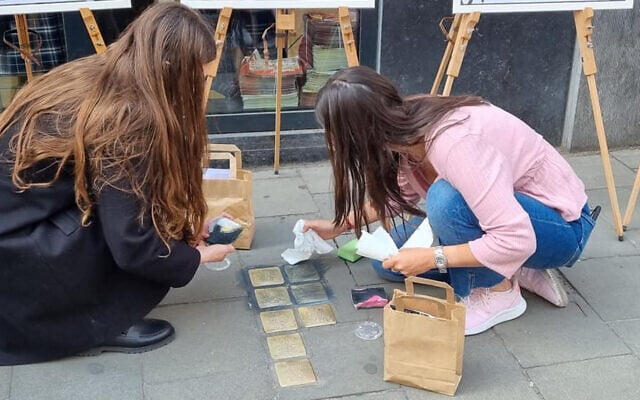
Volunteers clean Stolpersteine (stumbling stones) in Brussels, Belgium, during a Yom Hashoah Stolpersteine cleaning event co-organized with the European Jewish Association, April 27, 2022. (Courtesy of Make Their Memory Shine)
BRUSSELS, Belgium — A few months ago in Brussels, Arthur Langerman was telling high school pupils about losing family members in the Holocaust and escaping a Nazi raid himself, when he was cut short by two Muslim teens wanting to talk about Gaza.
“It’s a genocide, and it’s been happening for 75 years,” interjected one of the young women, triggering a heated back-and-forth about the Israeli-Palestinian conflict.
For their history teacher, Olivier Blairon, the scene sums up how hard it is to teach the genocide of six million Jews during World War II since the devastating Hamas-led invasion of southern Israel on October 7, 2023, that triggered the ongoing war in the Gaza Strip.
Blairon works in a large high school in the Brussels district of Koekelberg, home to a large community of Moroccan descent, where he said many students “identify with the violence suffered by Gazans.”
“I have heard antisemitic remarks,” Blairon said. “Some of my students mix things up” by equating all Jews with Israel, he said. Some are also deliberately “provocative.”
BRUSSELS, Belgium — A few months ago in Brussels, Arthur Langerman was telling high school pupils about losing family members in the Holocaust and escaping a Nazi raid himself, when he was cut short by two Muslim teens wanting to talk about Gaza.
“It’s a genocide, and it’s been happening for 75 years,” interjected one of the young women, triggering a heated back-and-forth about the Israeli-Palestinian conflict.
For their history teacher, Olivier Blairon, the scene sums up how hard it is to teach the genocide of six million Jews during World War II since the devastating Hamas-led invasion of southern Israel on October 7, 2023, that triggered the ongoing war in the Gaza Strip.
Promoted:+Jewish+Crossroads,Rachel+Goldberg-PolinKeep Watching
Blairon works in a large high school in the Brussels district of Koekelberg, home to a large community of Moroccan descent, where he said many students “identify with the violence suffered by Gazans.”
“I have heard antisemitic remarks,” Blairon said. “Some of my students mix things up” by equating all Jews with Israel, he said. Some are also deliberately “provocative.”
“So I take the time to unpick their preconceptions,” he said.
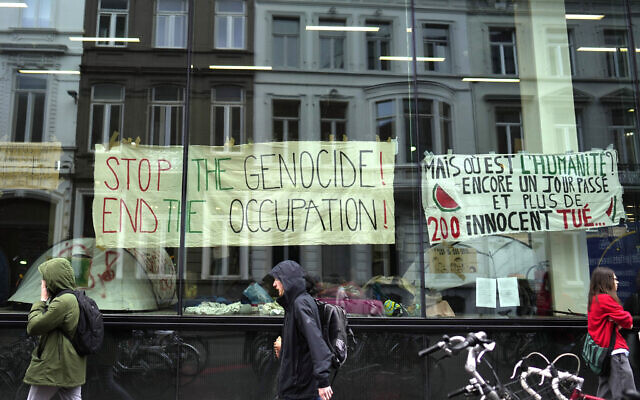
People walk by banners hanging inside a window of an encampment set up by pro-Palestinian and anti-Israel students and activists at Ghent University, as students occupy parts of the campus in Ghent, Belgium, May 16, 2024. (AP/Virginia Mayo)
Blairon’s students made up the lion’s share of youths present at the encounter with the 82-year-old Langerman, which AFP attended at the Belgian capital’s secular Jewish community center, the CCLJ.
“The October 7 attacks highlighted how hard it has become to talk about the Holocaust,” said the center’s co-director, Nicolas Zomersztajn.
“It’s more complicated in the current context,” said Zomersztajn, who laments how the Jewish community is constantly being asked to take a stance on the war in Gaza.
At the Brussels Jewish Museum, where four people were killed in a jihadist attack in 2014, a handful of school outings were canceled in the immediate aftermath of October 7.
Some students report sick on the day of a visit or find a way to avoid going on to see a nearby synagogue, said Frieda Van Camp, who works in the museum’s education department.
Hate messages
Antisemitism has been surging worldwide on a scale unseen in recent memory since the war in Gaza was sparked by the Hamas attack that killed some 1,200 people in Israel, mostly civilians. Over 5,000 terrorists burst across the border in a murderous rampage in which they also abducted 251 as hostages to Gaza, where 59 are still held captive.
Israel responded with a military campaign to destroy Hamas, remove it from power in Gaza, and secure the release of the hostages.
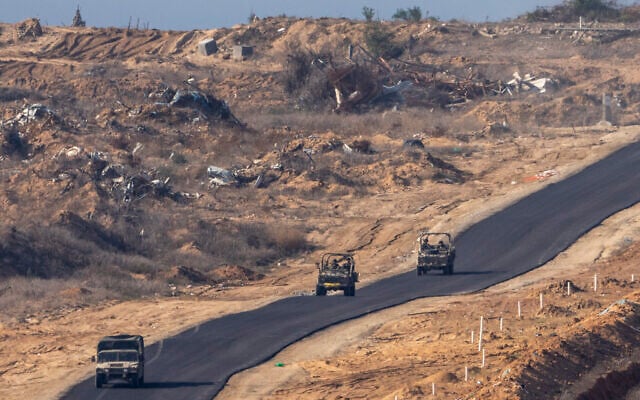
Israeli military vehicles move inside the Gaza Strip, as seen from southern Israel, January 7, 2025. (AP/Ariel Schalit)
The Hamas-run Gaza health ministry says more than 50,000 people in the Strip have been killed or are presumed dead in the fighting so far, though the toll cannot be verified and does not differentiate between civilians and fighters. Israel says it has killed some 20,000 combatants in battle as of January and another 1,600 terrorists inside Israel on October 7.
BRUSSELS, Belgium — A few months ago in Brussels, Arthur Langerman was telling high school pupils about losing family members in the Holocaust and escaping a Nazi raid himself, when he was cut short by two Muslim teens wanting to talk about Gaza.
“It’s a genocide, and it’s been happening for 75 years,” interjected one of the young women, triggering a heated back-and-forth about the Israeli-Palestinian conflict.
For their history teacher, Olivier Blairon, the scene sums up how hard it is to teach the genocide of six million Jews during World War II since the devastating Hamas-led invasion of southern Israel on October 7, 2023, that triggered the ongoing war in the Gaza Strip.
Promoted:+Jewish+Crossroads,+Joshua+LeiferKeep Watching
Blairon works in a large high school in the Brussels district of Koekelberg, home to a large community of Moroccan descent, where he said many students “identify with the violence suffered by Gazans.”
“I have heard antisemitic remarks,” Blairon said. “Some of my students mix things up” by equating all Jews with Israel, he said. Some are also deliberately “provocative.”
Get The Times of Israel's Daily Edition by email and never miss our top stories
Newsletter email address
By signing up, you agree to the terms
“So I take the time to unpick their preconceptions,” he said.

People walk by banners hanging inside a window of an encampment set up by pro-Palestinian and anti-Israel students and activists at Ghent University, as students occupy parts of the campus in Ghent, Belgium, May 16, 2024. (AP/Virginia Mayo)
Blairon’s students made up the lion’s share of youths present at the encounter with the 82-year-old Langerman, which AFP attended at the Belgian capital’s secular Jewish community center, the CCLJ.
“The October 7 attacks highlighted how hard it has become to talk about the Holocaust,” said the center’s co-director, Nicolas Zomersztajn.
“It’s more complicated in the current context,” said Zomersztajn, who laments how the Jewish community is constantly being asked to take a stance on the war in Gaza.
At the Brussels Jewish Museum, where four people were killed in a jihadist attack in 2014, a handful of school outings were canceled in the immediate aftermath of October 7.
Some students report sick on the day of a visit or find a way to avoid going on to see a nearby synagogue, said Frieda Van Camp, who works in the museum’s education department.
Hate messages
Antisemitism has been surging worldwide on a scale unseen in recent memory since the war in Gaza was sparked by the Hamas attack that killed some 1,200 people in Israel, mostly civilians. Over 5,000 terrorists burst across the border in a murderous rampage in which they also abducted 251 as hostages to Gaza, where 59 are still held captive.
Israel responded with a military campaign to destroy Hamas, remove it from power in Gaza, and secure the release of the hostages.

Israeli military vehicles move inside the Gaza Strip, as seen from southern Israel, January 7, 2025. (AP/Ariel Schalit)
The Hamas-run Gaza health ministry says more than 50,000 people in the Strip have been killed or are presumed dead in the fighting so far, though the toll cannot be verified and does not differentiate between civilians and fighters. Israel says it has killed some 20,000 combatants in battle as of January and another 1,600 terrorists inside Israel on October 7.
Advertisement
Israel has said it seeks to minimize civilian fatalities and stresses that Hamas uses Gaza’s civilians as human shields, fighting from civilian areas including homes, hospitals, schools, and mosques.
The Belgian anti-discrimination body Unia recorded 91 antisemitic incidents between October 7 and December 7, 2023 — compared to 57 for the whole of the previous year.
Most involved online hate messages directed at the Jewish community, which numbers around 30,000.
A May 2024 poll found that around one in seven Belgians felt “antipathy” toward Jews.
Antisemitic prejudice was disproportionate among people on the far left, far right, and in Muslim communities, the poll of 1,000 adults found.
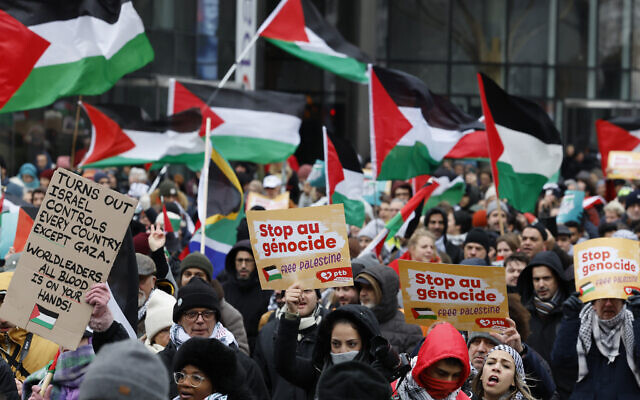
Demonstrators hold signs and wave flags during a pro-Palestinian, anti-Israel rally in Brussels on January 21, 2024. (AP/Geert Vanden Wijngaert)
When it comes to talking about Jews and the Holocaust in Brussels schools, “you can feel people tense up,” said Ina Van Looy, who is in charge of a project combating discrimination at the CCLJ.
“For some teachers, it has become difficult to take their students to any kind of Jewish site,” she said.
“Some teachers are completely overwhelmed by the way students get their information and how they talk about the conflict” between Israel and the Palestinians, she said. “Many of them feel helpless.”
During the talk with Langerman, it was Van Looy who stepped in to calm things down after the discussion turned to Gaza.
Afterward, it was agreed that she would visit the Koekelberg school to talk about the notion of genocide.
“These young people are hurt, they are angry. We have to listen to them,” she told AFP.
Not being ‘silenced’
In Belgium, all students are formally taught about the Nazi’s systematic slaughter of Europe’s Jews by the end of high school.
Schools organize trips from primary upwards to Holocaust memorial sites, such as Fort Breendonk near Antwerp or the Kazerne Dossin transit camp in Mechelen, where the country’s Jews were rounded up for deportation.
And pupils in Brussels regularly take part in inaugurating new “stolpersteine” or “stumbling stones” on the city’s sidewalks, in memory of Jews murdered in the Nazi death camps.

A boy visiting the Kazerne Dossin Holocaust museum in Mechelen, Belgium, on December 22, 2019. (Cnaan Liphshiz/JTA)
Between 1942 and 1944, some 25,000 Jews were deported from Belgium to the Auschwitz-Birkenau camp in Poland. Fewer than 2,000 survived.
But in the past few months, two primary school headteachers from Anderlecht, another Brussels district with a large Muslim population, decided their students would not take part in unveiling new stones.
They thought “it was not fair to impose that on students and parents” at the height of the Gaza conflict, said Bella Swiatlowski, of the Belgian association for the memory of the Holocaust.
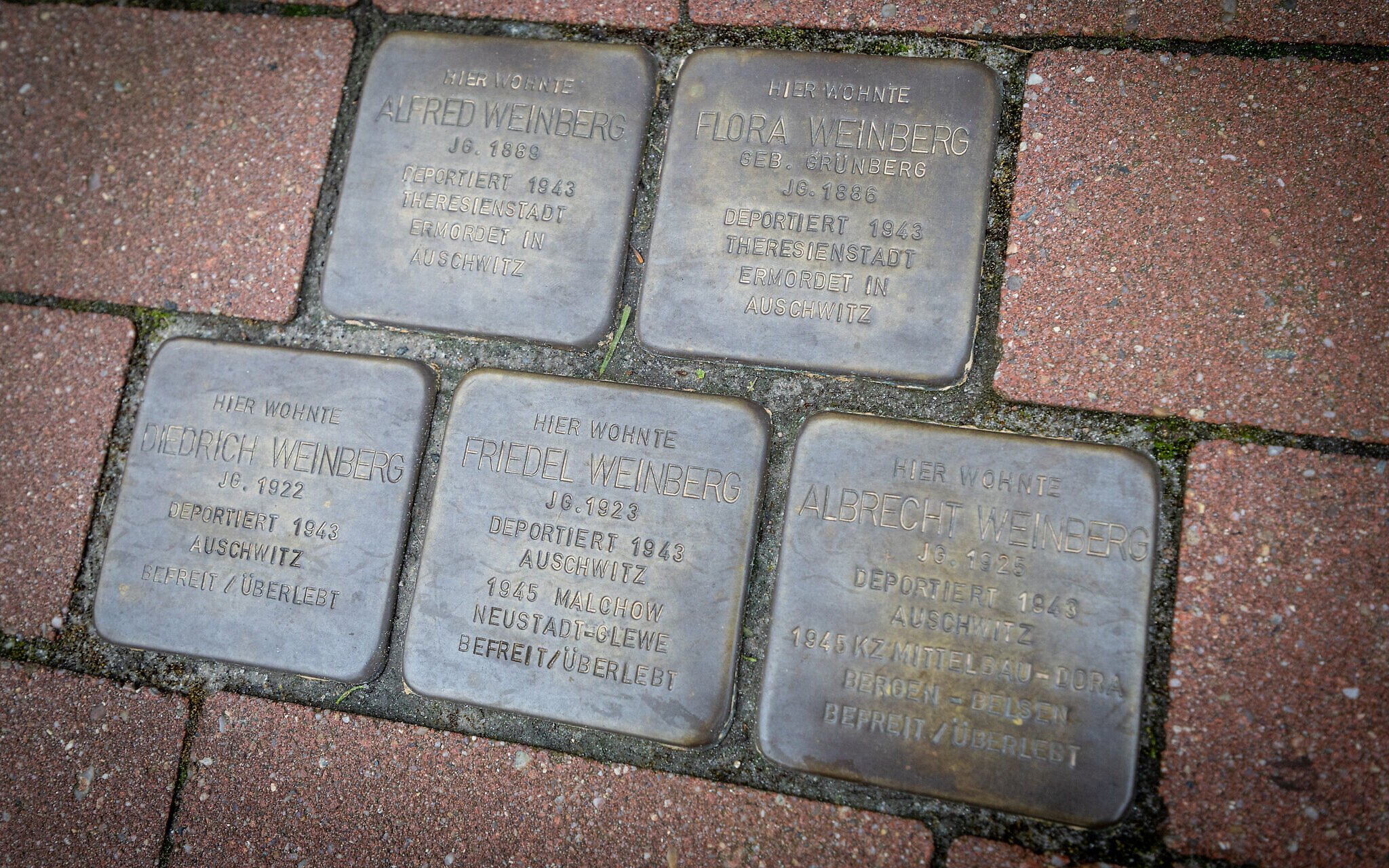
Stumbling Stones (Stolpersteine) are seen in front of the Weinberg’s former home in Rhauderfehn, near Leer, Germany, on December 30, 2024 (Focke Strangmann / AFP)
Neither head teacher wanted to discuss the issue when contacted by AFP.
Finally, the mayor of Anderlecht stepped in and found a way for the two schools to be represented at the inauguration ceremony in January.
That same month, dozens of primary and secondary schoolchildren took part in another “stumbling stone” inauguration marking 80 years since the liberation of Auschwitz, laying a white rose on the ground in a solemn and moving ceremony.
Faouzia Hariche, the Algerian-born deputy mayor of Brussels in charge of public education, paid tribute to the “courage” of teachers who refuse to “be silenced” on teaching the Holocaust.
“A small minority of teachers are fearful of tackling the subject,” she said. “We need to give them the tools to do so.”
